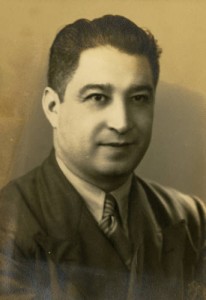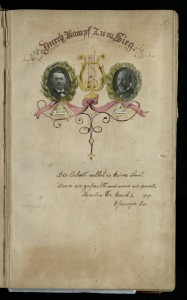
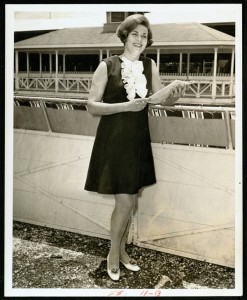
Betty Jukes, President of the Houston Junior Woman’s Club (1968, Betty C. Jukes Papers)
The following comes to us courtesy of Julia Taylor, Graduate Fellow for the Carey C. Shuart Women’s Archive & Research Collection.
This week marks the opening of three new collections from the Carey C. Shuart Women’s Archive and Research Collection, highlighting the lives and accomplishments of three Houston women—Betty C. Jukes, Claudia Kolker, and Marcella Perry. The University of Houston is proud to feature these diverse collections surrounding these very different, historically significant women.
The first finding aid belongs to the Betty C. Jukes Papers. Jukes worked for more than fifty years as an event planner, philanthropic fundraiser, and patron of the arts in Houston and beyond. She founded the Houston Junior Woman’s Club in 1968, and is a lifelong member of The Woman’s Club of Houston. Betty served as president of both organizations, and was also involved in the West Point Cadet Glee Club’s Houston performances. Betty even coordinated a World Wildlife Event where Prince Philip, Duke of Edinburgh, was the guest of honor!
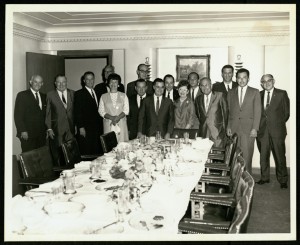
Marcella Perry and others enjoy a breakfast with Mayor Louie Welch (1965, Marcella Perry Papers)
The Claudia Kolker Papers, the second collection to be released to the public this week, catalogues the journalism and authorship of a Claudia Kolker, a journalist who has served as bureau chief for the Los Angeles Times, on the editorial board of the Houston Chronicle, and more. Her work has been featured in The Washington Post, The Boston Globe, The Economist, O: The Oprah Magazine, Slate, and Salon. She has reported from El Salvador, Mexico, India, and the Caribbean on politics, religion, and more. In 2011, she published her first book, titled The Immigrant Advantage: What We Can Learn from Newcomers to America about Health, Happiness and Hope. The collection contains Kolker’s research material and drafts of her book and an extensive catalogue of her published articles.
The papers of Marcella Perry are now also available to the public. Perry, a Houston Heights resident, was appointed to the board of directors of Reagan State Bank in 1950, making her one of the first female bank executives in Houston. In 1973, Marcella was appointed by Houston City Council to serve as the city’s first female commissioner of the Port of Houston Authority. She also served on the board of regents for Texas Woman’s University and was politically active for much of her life. Perry’s collection includes photographs, correspondence, and press clippings related to her work as a bank executive and Port of Houston commissioner.
Come by the reading room (located on the second floor of MD Anderson Library) to view these exciting new additions to the Carey C. Shuart Women’s Archives and Research Collection! For any inquiries about these collections, please contact archivist Vince Lee.
The following piece appears courtesy of Dan Johnson, 2013 Mosaic Fellow, wherein he provides a look at a sampling of projects benefiting from his internship with the University of Houston Special Collections.
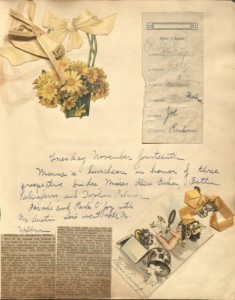
A full dance card (Gladys Ewing’s 1911 Houston Society Scrapbook, The Ewing Family Papers)
I was selected as a Mosaic Fellow in the Fall of 2013 by the Association of Research Libraries and the Society of American Archivists. I’m presently a MSLS student at the University of North Texas, studying Archival Studies and Digital Image Management. The Mosaic Fellowship included an internship component, pairing up fellows with host ARL institutions; I was glad to have the opportunity to intern here at UH Special Collections since September 2014. I’ve since had the pleasure of working on a variety of special projects, working hands on with archival materials.
I first started a digital audit of the Ewing Family Papers, comparing the physical archival collection to its finding aid and existing digital collection. In that review of the Ewing family scrapbooks, I worked with Valerie Prilop, Digital Collections Librarian, and we discovered that the finding aid for one of the scrapbooks provided descriptions for only the front side of each scrapbook page, but did not describe the reverse side, while the digital collection had page-level descriptions for both front and back sides of the pages. Ultimately, we were able to identify places where the finding aid could be improved, and we made some recommendations to combine two digital collections, one per scrapbook, into a single consolidated digital collection, a project for a later date.
I then started a project under the guidance of University Archivist Mary Manning, processing and describing additions to the William C. Moffit Papers. The collection was originally donated by Dr. Moffit himself, but several additions were later donated by his wife and family after he passed away. I was able to process and describe some additional manuscript parts, published musical arrangements, and Patterns of Motion training materials, among other things. Working with a member of the faculty from the School of Music who was intimately familiar with Dr. Moffit’s work helped me better describe and arrange the materials in a way that will make the most sense to researchers using this collection.
I started work on a third project with Hispanic Collections Archivist Lisa Cruces, auditing the physical material of the Alonso S. Perales Papers and comparing the physical archival collection to the finding aid. There were a handful of items in the physical collection that were not reflected in the finding aid, and I have been correcting the finding aid to more faithfully represent the collection.
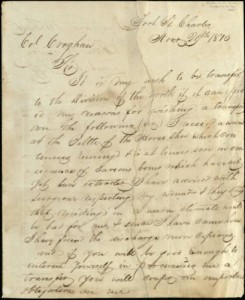
Request for transfer to a unit in the north signed by Sam Houston (November 29, 1813, Early Texas Documents Collection)
Most recently, I’ve been given the opportunity to work with Librarian Emerita Pat Bozeman on a project transcribing and contextualizing some handwritten letters. Two of these items were taken from the Early Texas Documents collection. One item is a letter from Sam Houston written after he was wounded in the Battle of Horseshoe Bend. It documents his request to be transferred from New Orleans to a more northern location upon the advice of several physicians. Another item is a letter that highlights Stephen F. Austin’s efforts to gather support from the United States government and people for Texas Independence and was written in Nashville, Tennessee days before Texas declared independence from Mexico. Working intimately with historical documents such as these has been a very exciting and rewarding experience.
The University of Houston Special Collections is happy to announce both the recent publication of the Houston Saengerbund Records in the UH Digital Library and significant additions and revisions made to the finding aid for the related physical collection housed here in Special Collections!
The Houston Saengerbund is a German singing society that has been active in Houston for more than a century and continues to perform at public events throughout Houston and Texas to this day. It was founded in 1883 and was one of many all-male singing organizations which formed in the German communities of Texas during the last half of the 19th century. These local groups were united under Der Deutsch-Texanische Saengerbund (the German-Texan Singers’ League), a regional organization that held biennial meetings and Saengerfeste (Singing Festivals) in various Texas cities. Both the digital collection and physical materials provide insight not only into the activities, performances, membership, and administration of this group, but also into its responses to major events and social changes throughout the last century of American history.
The digital collection consists of five bound ledgers covering the years 1874-1937. In these ledgers you’ll find meeting minutes, financial statements, programs, clippings, and correspondence between the Houston Saengerbund and other German organizations. The materials span the time from the group’s inception, through its growth to over 1000 members in the years before World War I, and to the formation of the Ladies Auxiliary and the Damenchor (Women’s Chorus) in 1937.
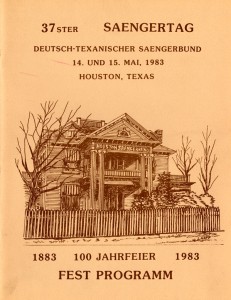
Program from the 1983 Texas Saengerfest, held in Houston and also marking the Houston Saengerbund’s centennial
The updated finding aid describes physical materials dating from 1874 to present. Here you’ll find songbooks and event materials, administrative records, legal files, financial records, and publications from all points in the group’s history. Of particular interest is the effect of anti-German sentiment that developed during the World Wars. With the onset of World War II, the Saengerbund members changed the name of the group to “The Houston Singing Society,” quit their primary activity of singing German songs, and began keeping minutes in English due to their concern about arousing anti-German sentiment. It wasn’t until after the war ended that the club members restored both their singing and their name.
The events mentioned above are just a couple of the points of interest to be found in the rich and storied history of The Houston Saengerbund. Check out the digital collection or visit us here in Special Collections to find out more!
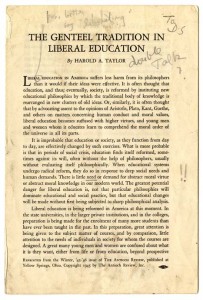
Ezra Pound, handwritten notes on “The Genteel Tradition in Liberal Education” by Harold A. Taylor, undated (Literary Manuscripts and Correspondence)
The University of Houston Special Collections is excited to announce the publication of the Literary Manuscripts and Correspondence finding aid. Items in this collection, which include letters, notes, and writings by several major literary figures, were previously housed separately in our A-Z files, but have now been gathered into one place to provide easier access for researchers interested in contemporary literature.
In this collection you’ll find items from many recognizable writers, such as Henry James, Gertrude Stein, Ezra Pound, Charles Bukowski, and Eugene O’Neill. The materials also cover a wide range of time periods and locales. The oldest item, a letter from English poet Richard Braithewate, was written in 1634, while the newest, an article written by James Thurber for the magazine Adirondack Life, is from 1991. The collection also contains materials both from close to home, including letters written by Texas’ own Katherine Anne Porter, and abroad, such as letters written by Irish novelist Norah Hoult and an autograph from Romanian playwright Eugène Ionesco.
Take a closer look at the finding aid to see which of your favorite authors make an appearance, or better yet, come visit us at Special Collections and see these unique and interesting materials in person!
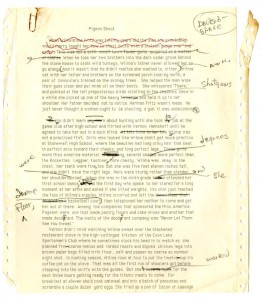
Page one of “Pigeon Shoot” chapter draft from Truck Dance, featuring edits from Donald Barthelme (Olive Hershey Papers).
We are very pleased to announce the recent publication of the Olive Hershey Papers finding aid.
Born in Houston, Texas in 1941, Olive Hershey was educated at Connecticut College and the University of Texas at Austin before attending the University of Houston’s Creative Writing Program. Studying under trailblazing postmodernist Donald Barthelme and alongside the likes of Tracy Daugherty, Hershey earned her M.A. from UH in 1987. Her published works include a collection of poems entitled Floating Face Up and her novel Truck Dance (originally her thesis while studying at UH).
The Olive Hershey Papers contain drafts, revisions, editorial notes, and writings from a handful of Hershey’s projects, however the bulk of materials are related to Truck Dance. Particularly noteworthy are the drafts of the various chapters filled with the edits and suggested revisions of Daugherty and the unmistakable scrawl and insight of Barthelme.
A fine complement to our Contemporary Literature collections, the Olive Hershey Papers help provide even more context for a community of authors that established the University of Houston as a destination for emerging and talented literary voices. For more information on the life and work of Olive Hershey we invite you to consult this newly published finding aid. The original materials of the Olive Hershey Papers can be viewed in the Special Collections Reading Room.
